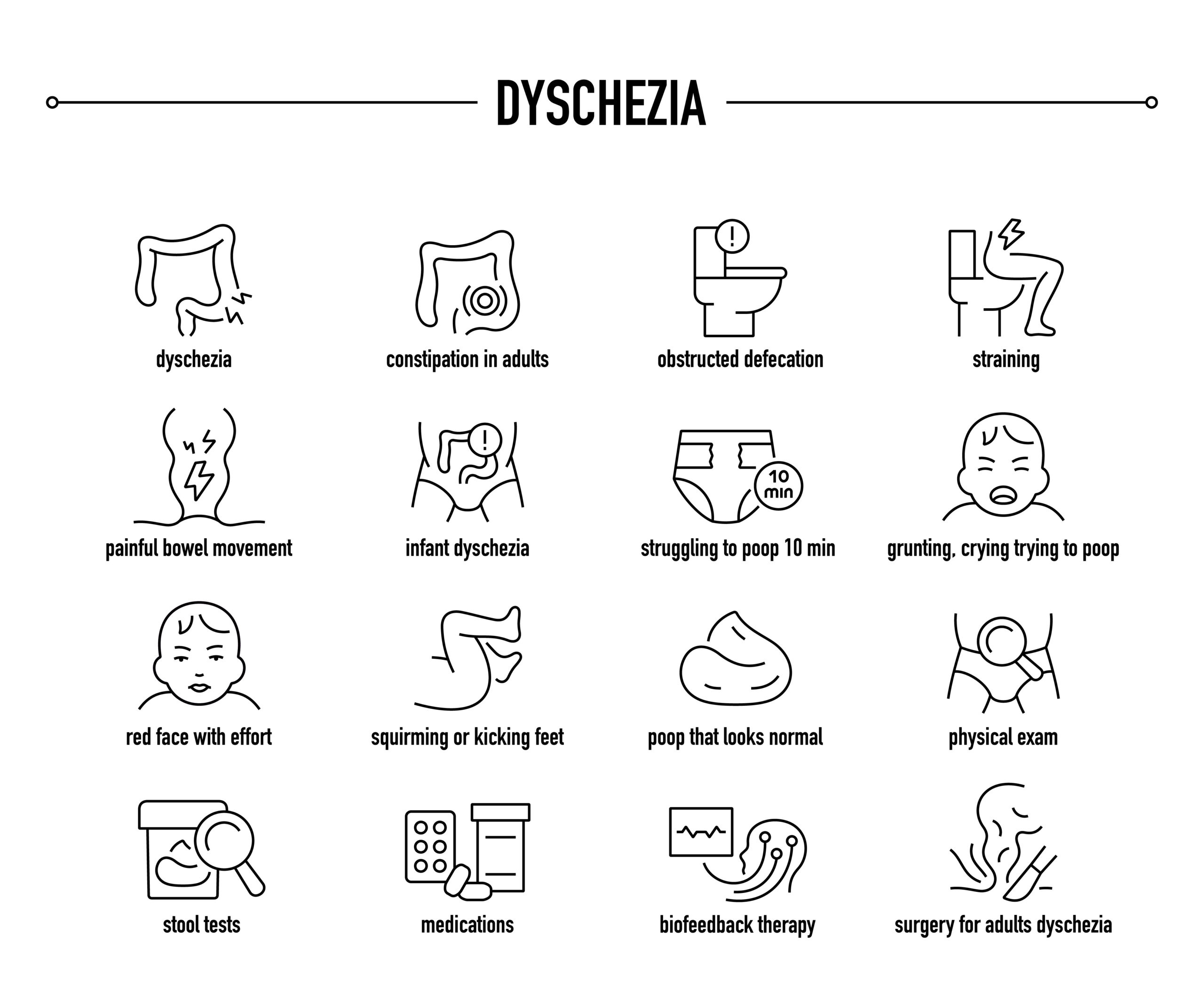
Hey parents! Have you noticed your baby straining or crying while trying to poop? If so, don’t panic—it might be infant dyschezia, a harmless condition that’s part of their natural development. Often referred to as grunting baby syndrome, this isn’t constipation but a temporary phase as your baby learns to coordinate their muscles for bowel movements.
Let’s explore everything you need to know about infant dyschezia, including how to spot it, when to worry, and simple ways to help your baby feel better.
Quick Facts About Infant Dyschezia
- What is it? A normal condition where babies struggle to coordinate their abdominal and pelvic muscles while pooping.
- Symptoms: Straining, crying, turning red, and passing soft stools.
- Duration: Most babies outgrow it by 2–3 months of age.
- When to call a doctor: If stools are hard, bloody, or delayed for 7+ days.
- Treatment: Usually none—just time, patience, and a few gentle techniques to help.
Symptoms of Infant Dyschezia
Babies with dyschezia often show these signs:
- Straining and crying for 10–30 minutes before pooping.
- Turning red or purple in the face.
- Grunting, screaming, or appearing uncomfortable.
- Passing soft, normal-looking stools.

Why Does Infant Dyschezia Happen?
Infant dyschezia happens because babies haven’t yet mastered the coordination needed for a smooth bowel movement. Here’s what’s going on:
- They tighten their pelvic floor muscles instead of relaxing them while pushing.
- Stretching their legs when they feel the urge to go makes pooping harder.
- Their muscles are still learning to work together, which takes time.
How to Help Your Baby: Simple Remedies
Most cases of infant dyschezia resolve on their own, but there are gentle ways to help:
| Technique | What to Do | What to Avoid |
|---|---|---|
| Tummy Massage | Gently rub your baby’s belly in a clockwise motion to relieve discomfort. | Rectal Stimulation: Using suppositories or thermometers can interfere with natural learning. |
| Leg Cycling | Move your baby’s legs in a bicycle motion to help stimulate bowel movements. | Unnecessary Remedies: Laxatives and medications are not recommended for this condition. |
| Warm Baths | A warm bath can relax your baby’s muscles and make pooping easier. | |
| Change Position | Lay your baby on their back and lift their legs slightly—this mimics a natural squatting position. |
???? Pro Tip: If you’re helping your baby with a warm bath, be mindful of getting water in your newborn’s ears to avoid irritation or infection.
When to Call a Doctor
While infant dyschezia is typically harmless, you should consult your pediatrician if:
- Your baby has hard or bloody stools.
- They haven’t had a bowel movement in 7 days.
- They seem to be in constant pain or have severe vomiting.
- Their symptoms persist beyond 3–4 months of age.
If your baby also has a fever or other signs of discomfort, check out our guide on baby fever to know when it’s time to worry.
FAQs About Infant Dyschezia
Q: How is dyschezia different from constipation?
A: Dyschezia involves soft stools and is caused by muscle coordination issues, while constipation causes hard, dry stools and can be linked to diet or hydration.
Q: How long does dyschezia last?
A: Most babies outgrow it by the time they’re 2–3 months old.
Q: Should I use glycerin suppositories?
A: No, they’re not recommended unless specifically advised by your doctor.

Quiz: Test Your Knowledge About Infant Dyschezia
- What is a common symptom of infant dyschezia?
A. Hard stools
B. Straining and crying before pooping
C. Fever and vomiting - When should you call a doctor?
A. If your baby grunts while pooping
B. If your baby hasn’t pooped in 7 days
C. If your baby turns red in the face - True or False: Infant dyschezia resolves on its own.
Answers:
- B
- B
- True
Final Thoughts
Infant dyschezia can be tough to watch as a parent, but it’s a normal and temporary phase in your baby’s development. With patience, gentle techniques, and the right guidance, your little one will soon be pooping like a pro!
If you have questions or concerns about your baby’s digestive health, East Lake Pediatrics is here to help. Our experienced pediatricians can provide personalized care and reassurance to guide you through every stage of your baby’s growth.
Contact us today to schedule an appointment or speak with one of our pediatric experts. Together, we’ll make sure your baby stays happy and healthy!
For more information, check out these resources:
- Cleveland Clinic: Infant Dyschezia
- Bladder & Bowel UK: Understanding Dyschezia
- About Kids GI: Infant Dyschezia
The information provided in this blog is for educational and informational purposes only. It is not intended as a substitute for professional medical, or healthcare advice. Always consult with a qualified healthcare provider for diagnosis, treatment, and answers to specific medical questions.

